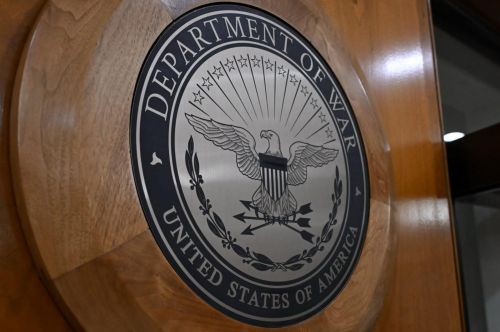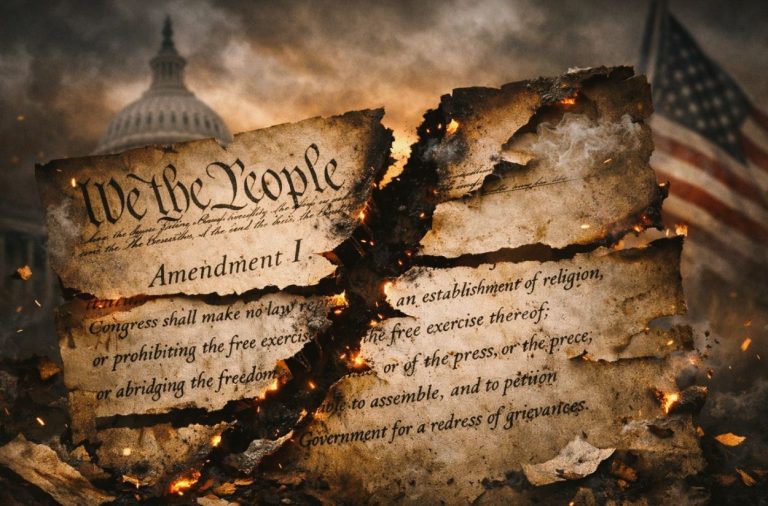

Trump has rebranded America’s military purpose in a way that reflects his own worldview: aggressive, unapologetic, and rooted in the language of conflict.

By Matthew A. McIntosh
Public Historian
Brewminate
Introduction: A Name That Speaks Louder Than Policy
Names have always been powerful in American politics. They frame not just institutions but identities. When President Donald Trump announced that the Department of Defense would once again be called the Department of War, he was not simply reviving an old title. He was redefining the way the United States presents its military purpose to the world.
It is a change that feels small at first glance, a matter of terminology. Yet names carry weight. They shape perception, and perception can guide policy. The return to “War” has unsettled allies and emboldened critics at home who see in the move a reflection of Trump’s combative worldview.
A History of the Pentagon’s Name
For more than a century and a half, the Department of War was the cornerstone of American military administration. From 1789 until 1947, its title carried no pretense: the United States built armies and fought wars, and the institution was named accordingly.
The shift came after World War II, when the world had seen the devastation that unchecked militarism could unleash. President Harry Truman’s National Security Act dissolved the War Department and created the Department of Defense. The new name was meant to project caution in an age of nuclear peril. “Defense” implied protection rather than aggression, a posture that suggested the U.S. held its arsenal reluctantly, as guardian rather than conqueror.
Trump’s reversion breaks with that legacy. It erases the mid-century attempt to soften America’s image and replaces it with something blunter. The symbolism may prove more enduring than the bureaucracy that implements it.
Why the Change Now?
Trump has never hidden his preference for the language of dominance. On the campaign trail, he spoke of “bombing the hell out of ISIS” and mocked past presidents for, in his words, “losing wars.” For him, military might has always been about winning rather than defending, about showing power rather than concealing it behind the cloak of necessity.
The timing matters too. Global tensions are rising: Russia’s aggression in Ukraine continues, China is flexing in the South China Sea, and domestic political pressure demands the projection of strength abroad. Rebranding the Department to emphasize “War” signals that his administration intends to meet these challenges with force as the first instrument, not the last.
For supporters, it is a refreshing honesty. America, they argue, has always fought wars; why pretend otherwise? For critics, it is a reckless provocation that normalizes violence as the natural state of foreign policy. Both camps understand that the name is more than cosmetic. It is a declaration of intent.
The Cultural Meaning of “War”
Language does not just describe reality; it shapes it. “Defense” suggests necessity, a shield raised reluctantly. “War” suggests choice, aggression, a willingness to strike first. That single word reframes the American self-image from protector to warrior.
The symbolic shift matters in subtle ways. A Department of Defense invites trust, a sense that the military exists to guard the nation’s safety. A Department of War invites unease, conjuring the specter of constant conflict. Citizens raised under the banner of “defense” are told that peace is the goal. Citizens who grow up hearing “war” may come to see violence as the baseline.
That cultural shift can be hard to reverse. Once normalized, the language of war infiltrates policy debates, budget discussions, and even the public imagination. The Pentagon itself, an institution that shapes its mission around its mandate, may begin to see force as not only an option but an expectation.
International Reaction and Global Stakes
Allies have reacted cautiously but with evident concern. European leaders already wary of Trump’s skepticism toward NATO view the renaming as confirmation that cooperation will take a back seat to unilateral force. Diplomats in Brussels and Berlin have quietly described the change as a “signal of aggression,” one that complicates the fragile consensus within the alliance.
Adversaries, meanwhile, are seizing the rhetorical gift. Russian state media has highlighted the move as proof of American belligerence, feeding its narrative that the U.S. is bent on domination. In Beijing, official statements frame the change as evidence that Washington sees confrontation with China as inevitable. Even if policy has not yet shifted, the optics matter. Words spoken in Washington echo in capitals around the globe, shaping calculations in boardrooms and war rooms alike.
Domestic Politics and the Appeal of Aggression
At home, the rebranding has split the public along predictable lines. Trump’s base applauds the move as straight talk, a rejection of what they see as Washington euphemisms. They argue that “defense” was always a polite fiction, that America’s military exists to fight and should be named accordingly.
Critics warn that the symbolism will bleed into substance. Names set expectations, and bureaucracies internalize their missions. A Department of War may find it easier to justify larger budgets, to prioritize offense over diplomacy, to frame international disputes as contests of strength rather than negotiations. What begins as a rhetorical flourish could evolve into a governing philosophy.
History shows that language and policy are not easily separated. Nations that glorify war in their institutions often drift toward policies that make war more likely. The danger lies not only in the present moment but in the precedent it establishes for the future.
A Dangerous Precedent
Renaming an institution of this scale does not only affect one presidency. It sets a trajectory. Future administrations may hesitate to revert the title, fearing accusations of weakness. The word “War” could become embedded in the bureaucratic DNA of the Pentagon, shaping generations of policy long after Trump leaves office.
The historical parallels are not comforting. When governments embrace the language of war, they often find themselves trapped by it. War becomes the default framework for understanding international relations, and peace the exception. Trump’s move may be remembered not just as a symbolic gesture but as the moment when the United States embraced a more openly martial identity.
Conclusion: Naming the Future
By restoring the name Department of War, Trump has done more than resurrect a piece of history. He has rebranded America’s military purpose in a way that reflects his own worldview: aggressive, unapologetic, and rooted in the language of conflict.
It is a decision that unsettles allies, emboldens adversaries, and reshapes the way Americans themselves imagine their role in the world. Words, once chosen, can chart paths as surely as policies. And with this one, Trump has charted a course that may make war not the exception, but the expectation.
Originally published by Brewminate, 09.18.2025, under the terms of a Creative Commons Attribution-NonCommercial-NoDerivatives 4.0 International license.


